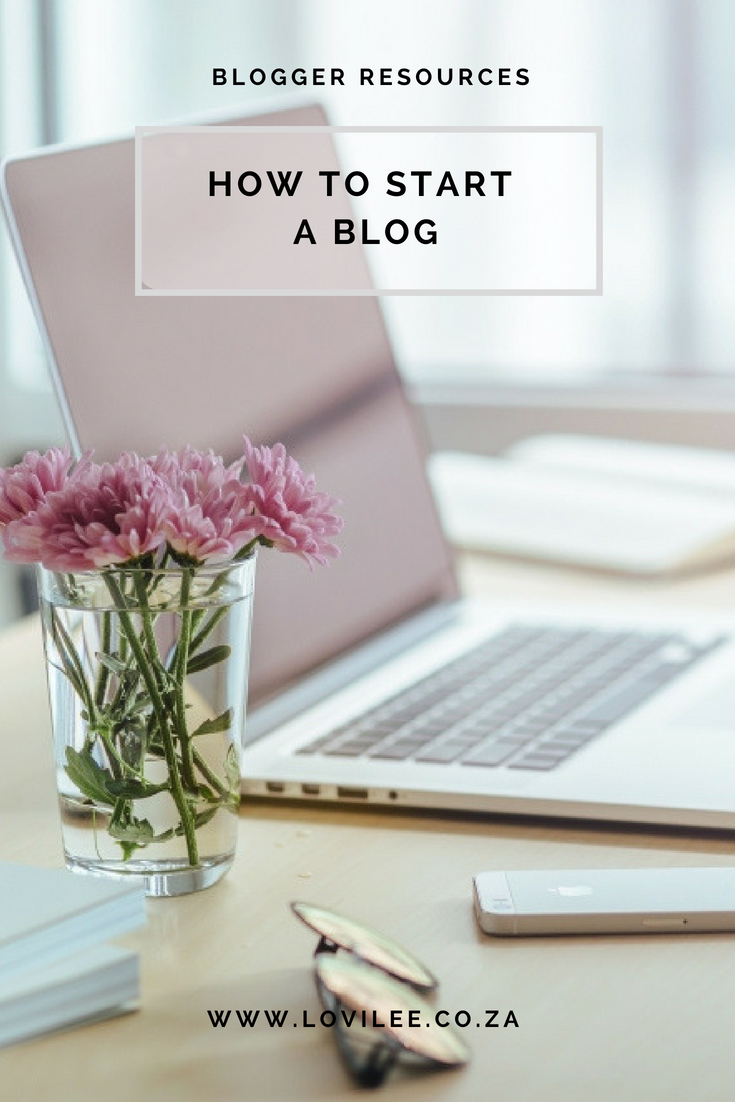Since I started lovilee.co.za in March 2010, I have had quite a few inquiries on how to start a blog. There has been some technical questions asked, but also some general know-how ones. I thought I’d share some of what I have learnt over the past few years. Feel free to post some questions below and I will try to answer them as best as possible.
Note that I do not view myself as an expert on blogging by any means. I am simply sharing from my own experiences (but I do have a coding background).

How to start a blog – Things to consider before starting a blog
What is a blog?
Blogging has evolved from the original ‘diary-like’ entry system with someone jogged their thoughts down for others to read to something so much more. Photographers use it to showcase the gorgeous photos, Foodies get to share recipes that people would previously only have been able to found in published recipe books and people like me, get to showcase things I love and am passionate about and try to inspire others on a daily basis.
Essentially, a blog is a type of website that gets updated on a regular basis with new content (called a blog post), not overriding previous content but adding to it.
What do you need to know before starting a blog?
Blogging is hard work but fulfilling. To organise articles regularly, to try and keep content fresh and relevant is by no means easy. It takes a good few hours to put a good article together, research the SEO (because this is REALLY important) and then updating all my social media networks!
When I was still researching starting a blog, I read a very interesting article stating that you need to spend at least 3-4 hours per day on a blog or the social media linked to your blog to make it successful and I agree!
Why do I still work part-time?
A lot of people are surprised that I seem to be living the dream and still choose to go into an office from time to time. Why do I do it? I loooove working at the company I work at, the people and work are great! I love getting dressed up in the morning going to the office, coming home and feeling that I have accomplished something great! Keeping up with what is going on in the world of technology and making sure that my skills stay up to date is also important for me.
Believe it or not, full-time blogging can get lonely at times. Whilst I interact with a large number of people on a daily basis, it is all through social media or online… There is seldom face-to-face contact, which I NEED!
Questions to ask yourself before you start a blog
‘What do I want to blog about?’ Is there anything you enjoy or are really passionate about or do you want to use a blog to promote your business or profession?
‘How frequently do I want to post articles?’ Rather start off with one or two days a week on a regular basis than a full week and realise you cannot keep up the work after a few months.
‘Do I want to generate any revenue from my blog?’
READ MORE: How to make money from blogging
I am very lucky to have a supporting husband and some great, like-minded friends, who have encouraged me to go on when I felt pressing the ‘DELETE’ button on it all. Remember you are never too old and it is never too late to start considering a blog, if you ‘Do what you love, you will love what you do!”.
What is the best blogging platform?
What is a blogging platform?
When I first started lovilee, I used the free Blogger platform, it was super easy to set up and get the blog posts rolling. It is a great tool for anyone who has no coding experience whatsoever and you can get your blog set up and looking ‘ok’ within a short space of time. Over time I wanted to make some changes to the blog and started looking for ‘add-ins’ or ‘plug-ins’ to assist.
Add-ins are essentially little pieces of code created by yourself or others that you just plug into your blog to make something happen. E.g instead of programming a calendar into your blog or website you can just download, drag and drop it into yours with two or three clicks.
Which blogging platform do I blog on?
As I started searching for plug-ins on Google the word ‘WordPress‘ seemed to come up very often… I decided to create another test site on the free WordPress platform (WordPress.com) and after playing around decided that this was the option I wanted to switch to. There were nifty options that allowed me to import all my content from Blogger directly to WordPress with a click of a button, so the transition was really easy.
Essentially you will have to make your own choice when it comes to the Platform option you choose. I am obviously a HUGE WordPress fan, as it is very, very easy to use, has great functionality and there are soooo many resources on the web to assist with regards to queries and questions you have. I also host my blog on Bluehost, read more about how to choose the right hosting here.
Still need convincing? Read this great article that was recently published by my nr 1 go-to site www.wpbeginner.com.
Can I start a blog for free?
I initially started Lovilee on a free option, as I was unsure whether I wanted to turn my idea into a revenue-generating business. I was also confused on how to go about choosing a hosting option, what would I need etc. etc.
What free blog platforms are out there?
What free options are out there? Two of the most popular free options you have to choose from is the WordPress.com platform and the Blogger platform mentioned above. What it essentially means to have a free site is that you cannot choose your own site address. A site address is referred to as an ‘URL’, it is the address that you type into the search engine/browser that you use to explore the internet with to take you to a specific site and is unique to each website on the internet.
If you use a WordPress free option your site’s address might have looked something like lovilee.wordpress.com.
When creating a blog initially this may prove to be a good start, but you might soon find it limiting should you want to add a paid theme {a ‘theme’ is essentially a pre-built look and feel that makes your website look pretty without you almost having lifted a finger} for your site. Some functions are also in some cases disabled on free themes, e.g. in WordPress the ability to upload movies does not work in the free option as movie files tend to take up lots of space.
I believe that it looks much more professional if you are running a business to have your own url or domain as it is also called. Lovilee went from lovilee.blogspot.com to www.lovilee.co.za and it just looked more, well lovilee.
Where can you get your own url?
There are various companies that you can register on for a url, the price options may vary across all of them with the .com options in most cases the highest option. Some hosting companies give you a url for free if you host through them and others require you to pay a once-off registration fee and then an annual renewal fee. It is best to shop around to see what is easiest. You do not have to register a url and host with the same company. I for instance got and renew my url through Domains.co.za and host through on their cloud hosting package. (Note that I do earn a small commission on referrals to both these companies, but make use of them and have been really happy with their services and products myself)
Why do I need a domain and hosting?
Just like you have to pay rent or a bond when you have an address or place you stay in, so also do you have to pay for hosting if you want to add a website on the address that you reserved for use. Hosting fees can differ substantially across companies and then when you add in offshore vs. local companies you can get even more confused. You will have to ask the hosting company that you are interested in using what the requirements are that you need to host your platform on. WordPress, for instance, requires SQL which is normally on a slightly more expensive option as an entry-level hosting option.
Two things that I would advise on is that you ensure that the hosting company provides a c-panel and if you are still a beginner when it comes to web things, rather go with a local hosting provider that is easier accessible via telephone for instance on their help desks, or if you decide to go offshore a company that provides 24-hour support or is in more or less the same time zone as where you reside.
Most hosting pricing options that I experienced do include 1 or more email addresses with the hosting, but make sure that you have the adequate number of email addresses included in the option you choose, should you want to make use of an email address similar to your url like ‘[email protected]’ for instance.
Now that was a mouth full! Hope that it has answered some of your questions!
Convinced that you’d like to start your own blog? Here with step-by-step instructions on how to start your own WordPress blog.
Let's get social
Instagram: @lovilee_zaTwitter: @lovilee_za
Facebook: @lovileeblog
or subscribe to never miss out on any new articles in this link.




2 Comments
So informative. THANK YOU! You need to do a course next. x
hehe, on my to do list